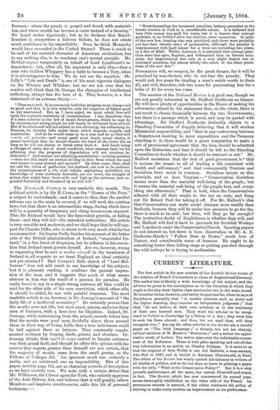CURRENT LITERATURE.
The first article in the new number of the Scottish Review treats of the relation of Scotch Universities to those of England and Germany. The author has evidently a wide knowledge of his subject, and the advices he gives to his countrymen as to the direction in which they ought to develop their higher-clans seminaries are, in the main, sound. He is rather bitter, however, and surely he goes too far, when he says of Scotchmen generally that " in certain matters, each as music and the higher learning, they exercise no independent judgment ;" that they " do not believe in their own scholars, or in the testimony of their own learned men. They want the scholar to be recog- nised in Oxford or Cambridge by a bishop or a don ; they want him to seek his fame abroad ; and then, but not until then, will they recognise him." Among the other articles in the Review are a careful paper on " The Irish Language ;" a sharply, but not too sharply, critical estimate of M. Renan's " Souvenirs ;" and a rather too appre- ciative study of Luther. The writer slurs over the indubitable coarse- ness of the Reformer. There is both plain-speaking and out-of-the- way information in an article on Charles Dickens. It is news to us that the original of Sam Weller is one Job Baldwin, a man-servant who died in 1837, and is buried in Raiuham Churchyard, in Kent. The editor of the Revieto has wisely opened his columns to writers of all shades of politics, and so he has done no harm in printing a paper with the title, " What is the Conservative Policy ?" But it is a very juvenile performance, all the same, the veriest Churchill-and-water, in fact. The Review, which has now commenced its second year, seems thoroughly established on the other aide of the Tweed. Its permanent success is assured, if the editor continues his policy of striving to make every number an improvement on its predecessor.






































 Previous page
Previous page